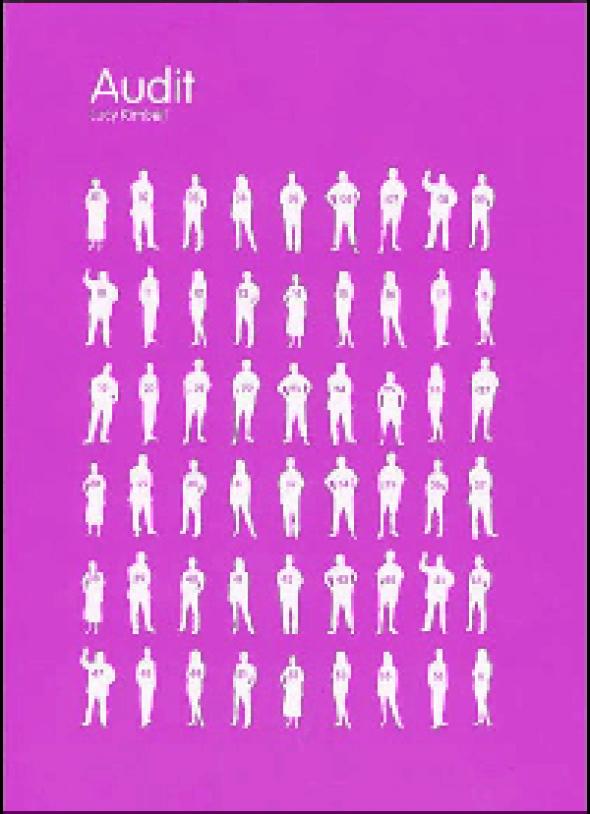Audit
by Benedict Seymour
‘Fools lament the decay of criticism.’ Fortunately there’s no need to offer a critique of Lucy Kimbell’s book, Audit, since it is already ample proof of the disappearance of critical distance. The modernist opposition between commerce and culture – however artificial, it was still operative – has imploded. This is an operational text and only an operational ‘review’ could do it justice. In the same way that discourse in the corporate world functions to facilitate the flow of money, a way of making exchange value happen under the flimsiest pretence of meaning, a review of this book must reproduce the ideology of something being said by someone for someone else’s intellectual consumption, perpetuating the illusion that there is a text to be read, work to be done.
However, since information is strictly indifferent and meaning only its ghostly shadow, there is no such object. This book’s complacent statistical regurgitations of the (false) problem of value need not be ‘opposed’ and so legitimated with the counter-object of a review. It is sufficient that 500 words should appear here and all the various intellectual proprietors get their due as brands. The anonymous respondents to the questionnaire which furnishes Audit’s raw data (‘What am I worth?’, asks Kimbell), anyone I may have discussed this text with, etc., remain unpaid ‘externalities’. For this book is/not all about the (non)measurability of value. It does/not make good use of the methodology of the financial audit as a kind of outsourced autobiography of the artist-management consultant Lucy Kimbell. As long as I spend no more than 10 minutes reviewing it (as one of the book’s helpful charts attests), my hourly rate remains equivalent to that of a well-paid prostitute.
What Audit is really about is its own value as contribution to a flow of information. As such it is priceless: 1) economically, because as a reviewer I don’t have to buy it; 2) philosophically, because ‘intellectual’ value cannot be stated numerically or in any propriable form; 3) demotically, because of the work it performs in intensifying the informational flow between what might once have been termed artistic and commercial moments in the larger field of capitalist accumulation. The book exists to lubricate this intercourse between worlds that are already thoroughly symbiotic. Audit is pure synergy and its author’s success in whatever field will rely on her ability to work the point of convergence and discursive indifference at which her practice is positioned.
Such an equivocally ‘self-critical’ ‘work’ is better seen as part of the artist-consultant’s career. Audit is the necessary ‘deliverable’ pretext for a series of commercial interactions. Its content is tailored to a confessional society’s lust for self-metrication and generated out of the art world’s delirious awareness of its own productive paradox in a wider economy gone terminally creative. This is hardly news, however, and it is remarkably tiresome to be reminded again of art’s role as paragon of the creative industries.
As a self-reflexive punt, Audit may or may not add value to the Kimbell brand but, if you still feel willing to deal in such things, it certainly produces (and of course anticipates) a real affective charge – queasy tedium building to claustrophobia. The climate of the book is that of a contemporary office, a brothel of low intensity chatter in which each employee ponders how much better or worse off they might be if they moved to another firm or switched to another career path. Kimbell’s book turns this self-assessment daydream into a tool for self-advancement. There is something abysmal – in both senses of the word – about the recursiveness of this project.
Kimbell’s glib or ‘quirky’ first person intrusions into what would otherwise be merely a watered-down repetition of earlier conceptualist applications of biometrics to the so-called self only render the experience of reading Audit more obnoxious. Rather than attempting to recoup the personal from the dispersal thereof in which this self-audit conspires, it is of more value to recall that no one is the ultimate beneficiary of the book’s actuarial navelgazing. Contemporary cultural products such as this simultaneously depend on and denegate the radically im-proper character of the production of value. Kimbell doesn’t show any signs of having got her head around the central emptiness of the concepts of value she deploys. The writings of Marx or any later critics of bourgeois economy are signally absent from the book’s bibliography. Symptoms of a crisis of measure are all over the text but are not encouraged to challenge the nihilism of the separation between economic and ‘spiritual’ value that Kimbell’s questions presuppose.
As such this book is/not worth reading but it is/not worth thinking about. But now my hourly rate has gone down to that of a call centre operative so I must stop.
Audit // Lucy Kimbell // Bookworks // 2002 // ISBN 1-870699-60-2 // £9.95
Lucy Kimbell: [http://www.lucykimbell.com]Bookworks: [http://www.bookworks.org.uk]
Mute Books Orders
For Mute Books distribution contact Anagram Books
contact@anagrambooks.com
For online purchases visit anagrambooks.com








